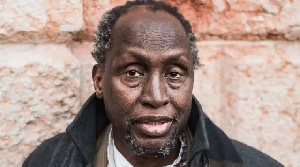- Home - Entertainment
- Lifestyle News
- Year In Review
- Music News
- Entertainers
- Entertainment Archive
- Entertainment Photos
- Jokes
- Entertainment Headlines
- Ameyaw Debrah
- Brown GH
- Celebrities Buzz
- GH Base
- Ghana Celebrities
- Gh Gossip
- GH Page
- GH Splash
- Hot Gossip GH
- YEN
Entertainment of Thursday, 29 May 2025
Source: www.ghanawebbers.com
Giant of African literature Ngũgĩ wa Thiong'o dies aged 87
Ngũgĩ wa Thiong'o, a giant of African literature, has died at 87. He was a storyteller who faced jail, exile, and illness. His work spanned six decades and documented Kenya's transformation from colonial rule to democracy.
Ngũgĩ was often predicted to win the Nobel Prize for Literature. Fans were disappointed each time he missed out on the award. He will be remembered as a great writer and advocate for native African languages.
Born James Thiong’o Ngũgĩ in 1938, he grew up in Limuru. His family were low-income agricultural workers under British colonial rule. They saved money to send him to Alliance, a boarding school run by missionaries.
In an interview, Ngũgĩ recalled returning home from school to find his village destroyed by colonial authorities. His family was among many forced into detention camps during the Mau Mau uprising. This movement lasted from 1952 to 1960 and deeply affected Ngũgĩ's life.
Tragically, his brother Gitogo was shot by a British soldier for not hearing commands due to deafness. In 1959, Ngũgĩ left for Uganda to study at Makerere University. This university is one of Africa's most prestigious institutions.
At Makerere, he shared his debut novel manuscript with Chinua Achebe. Achebe helped get the book published in the UK in 1964 as Weep Not, Child. It became the first major English-language novel by an East African.
Ngũgĩ quickly followed with two more novels: A Grain of Wheat and The River Between. By age 33, he was recognized as one of Africa’s outstanding writers by The Times newspaper in the UK.
In 1977, everything changed for Ngũgĩ. He adopted the name Ngũgĩ wa Thiong'o to shed colonial influence. He also decided to write only in Kikuyu instead of English.
His last English-language novel was Petals of Blood, published that same year. This book criticized both colonialism and Kenya's new leaders after independence. It portrayed them as betrayers of ordinary Kenyans.
That year, he co-wrote the play Ngaahika Ndeenda (I Will Marry When I Want). The government shut down its theatre run under President Jomo Kenyatta. Ngũgĩ was imprisoned without trial for a year but wrote his first Kikuyu novel there.
He used toilet paper because he had no notebook while incarcerated. After being released when Daniel arap Moi became president, Ngũgĩ learned about a plot against him during a London book launch.
He then went into self-imposed exile in the UK and later the US for 22 years before returning home. Upon his return, thousands welcomed him back warmly but tragedy struck soon after when assailants attacked him and raped his wife.
Ngũgĩ claimed this assault was politically motivated and returned to the US afterward. He held professorships at Yale University and others while advocating for literature in African languages.
Throughout his career, most African literature remained dominated by works in English or French—official languages across many countries on the continent. In his essay collection Decolonising the Mind, he questioned why Africa needed European languages at all.
He even criticized Chinua Achebe for writing in English; their friendship suffered as a result. Outside literature, Ngũgĩ married twice and had nine children; four are published authors themselves.
In a light-hearted moment during an interview, he joked about competing with his own children as literary rivals. However, allegations arose from his son Mukoma wa Ngugi regarding physical abuse towards their mother—a claim that went unanswered by Ngũgĩ wa Thiong'o.
Later in life, health issues plagued him; he underwent triple heart bypass surgery in 2019 and faced kidney failure too. Diagnosed with prostate cancer in 1995, doctors gave him three months to live—but he recovered once again despite numerous challenges throughout his life.
Now one of African literature’s guiding lights is gone—leaving behind a darker world of words—as noted by Nigerian writer Chimamanda Ngozi Adichie.











